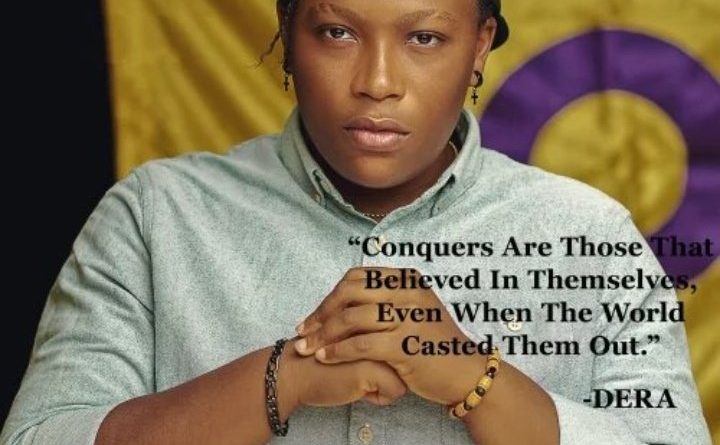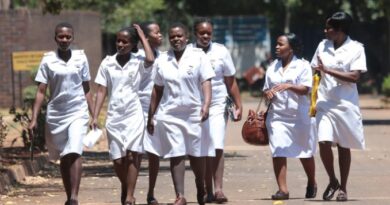A mother’s struggle with an intersex child in Zimbabwe
GRACE (not real name) is a troubled soul after she gave birth to an intersex child.
“I gave birth to Tatenda (not real name) on August 1 2013. It took some time for me to accept his condition. It’s a painful situation,” she said.
Tatenda was born intersex, a reproductive or sexual anatomy that does not seem to fit the typical definition of female or male, according to the Intersex Society of North America.
Contrary to the layman’s belief that intersex people are part of the LGBTQ community, being intersex means not fitting into the binary sexes, with variations in chromosomes, hormones or other physical characteristics.
It is a biological condition. It is estimated that up to 1,7% of the world’s population is born with intersex traits.
For Grace, finding out that her child was intersex was quite a challenge and it took some time for her to accept and appreciate it.
She has endured the stigma associated with intersex, which is confused with homosexuality.
In Zimbabwe, homosexuality is strongly detested, worsening Grace’s challenges with her intersex child.
“Tatenda has challenges at school and in the community, being laughed at and is sometimes told he is of a confused gender. Tatenda is also labelled a curse,” she said.
As fate would have it, Grace lost the support and care of a person who should naturally comfort her and be a shoulder to lean on, her husband.
According to her, he has drifted from the family man he was before being aware of their son’s condition.
For them, there is literally no family life to talk about, with violence and distance increasing each day.
“Another challenge we are facing is with his very violent father, which troubles our son. He does not contribute to our children’s upkeep,” she said. “When he does menial jobs, he comes home drunk and harass me and the children.”
She has been forced to endure the whole situation alone.
Grace survives on piece jobs and sometimes depends on farming in her small garden to ensure the survival of the family.
The couple has five children, Tatenda being the second.
She worries over his condition, which is not really stable.
“Tatenda is always sick, complaining of back ache and stomach pain, and I am facing challenges to take him for medical check-up.
“We survive on menial jobs. Life is tough and Tatenda’s situation makes it worse. It is my desire to run a project while taking care of my children at home. I wish to see Tatenda through school and become someone in life,” she said.
Grace is hopeful that time will heal her wound and is optimistic about venturing into a chicken business, which will allow her to look after her children.
Intersex persons face a lot of challenges owing to the confusion that surrounds their condition.
Kudakwashe Murisa from the Intersex Community of Zimbabwe said he experienced a lot of challenges when growing up.
“Simply because of societal norms and values, and also the society does not accept intersex persons, so we face a lot of challenges that include stigma and discrimination, and the issues of non-consensual surgeries that are being performed on intersex persons, and also lack of access to education.
“When an intersex person is born, they assign a sex which is either male or female, but then when you grow up, sometimes you know because of the biological makeup, it does not fit, it doesn’t align with what you were assigned.
“Then you would have acquired documents, that is, the national ID or birth certificate, which then becomes difficult to use when it does not fit, when it does not match your biological makeup.”
Health law and policy consortium of Zimbabwe projects coordinator Dorcas Chitiyo said intersex people faced challenges in respect to matters concerning legal recognition, as the legal framework is binary in the classification of sex, leaving out intersex people.
“They are neither male nor female. An intersex person, according to the definition given by the African Commission Resolution 552 on the protection of intersex children in Africa, is someone who has ambiguous genitalia and they can have differences that manifest in their gonadal, hormonal or chromosomal makeup,” she said.
“They face a lot of challenges stemming from the fact that currently, our policies and our legal position exclude them.”
Chitiyo called for the deferment of surgery on intersex persons until a stage when the dominant sex is evident to avoid the confusion that is usually associated with the condition.
“We need the government to acknowledge that intersex people exist. The moment the government recognises that intersex is a separate sex category, many things will change, including the treatment they get in society,” she said.
The country’s laws do not recognise intersex as a gender marker, forcing individuals to conform to binary gender categories at birth, often through irreversible surgical procedures or inaccurate documentation.
Zimbabwe Association of Doctors for Human Rights secretary-general Norman Matata said their main focus was on educating intersex individuals and their parents because they mostly do not know much about these condition.
“We mainly want to emphasise that intersex individuals are biological variations and are not pathological, so that we don’t aim at correcting them.
“Our main focus is on making sure that we don’t do non-consensual surgeries, but we offer psychosocial support, emotional support and also social support to the individuals until they grow up and then they can make their own decisions concerning their own health.
“The approach has been to offer early medical, surgical and hormonal treatment to intersex individuals while they are still young.
“We are against this approach and we are happy that globally there’s been a shift to promoting a more human rights-based approach to intersex individuals, where we delay surgery until people are old enough to give their own consent.”
He said Zimbabwe did not have guidelines for medical practitioners on how to treat intersex individuals.
“So we are actually pushing that there be guidelines which clearly state how we approach intersex individuals, mainly on the issue of delaying medical or surgical interventions until people are old enough,” Matara said.



